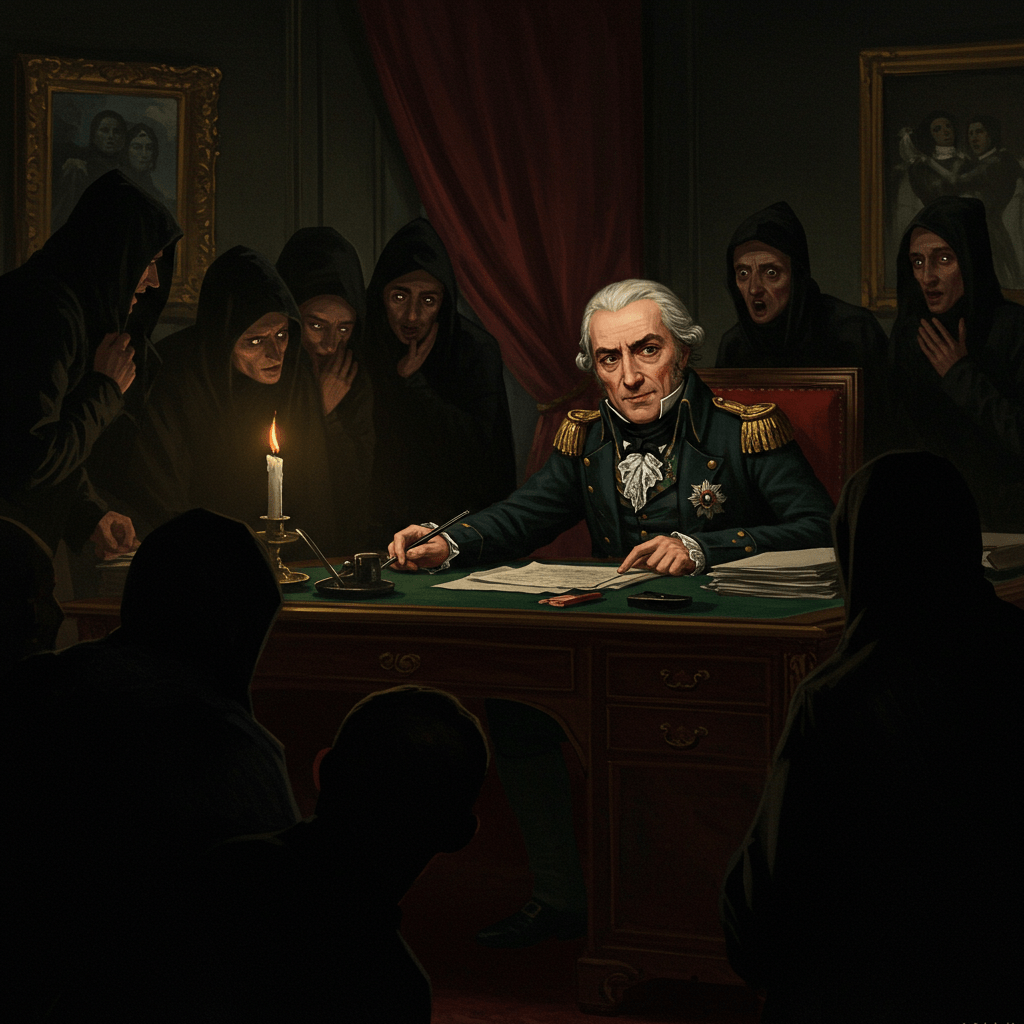Paris, an autumn evening of 1796. A chill wind whipped through the narrow, cobbled streets, carrying with it the scent of woodsmoke and the ever-present undercurrent of fear. The Directory, that fragile vessel navigating the tempestuous seas of post-revolutionary France, clung precariously to power. Shadows danced in the flickering gaslight, concealing secrets as dark and treacherous as the Seine itself. In the labyrinthine heart of the city, a web of intrigue was spun, its threads invisible to the casual eye, yet binding the fate of the nation.
Joseph Fouché, Minister of Police, sat in his dimly lit office, a figure both imposing and enigmatic. His eyes, dark pools reflecting the city’s anxieties, scanned the latest reports. His network, a vast and shadowy army of informants, spies, and agents provocateurs, stretched its tendrils throughout France, reaching into every corner of society, from the grand salons of the aristocracy to the grimy taverns of the common people. He was the architect of this clandestine empire, a master puppeteer pulling the strings of power in the shadows.
Les Agents de l’Ombre
Fouché’s agents were a motley crew, bound together not by loyalty or ideology, but by self-interest and a shared understanding of the precariousness of their existence. There were the seasoned veterans, hardened by years of political turmoil, their faces etched with the weariness of countless clandestine missions. There were the ambitious young men, eager to climb the ladder of power, their loyalty bought with promises of influence and reward. And then there were the informers, those who lurked in the shadows, their motivations ranging from personal vendettas to simple greed. Each played a crucial role in the elaborate game of deception and counter-deception that defined Fouché’s reign.
One such agent was a former Jacobin named Dubois, a master of disguise and infiltration. His mission: to uncover a royalist plot brewing in the heart of the Vendée. Another, a charming courtesan known only as Madame X, moved through the Parisian elite, gathering whispers and secrets, her beauty a potent weapon in her arsenal. Each agent, a pawn in Fouché’s grand strategy, was carefully placed, their movements orchestrated with precision and ruthlessness.
Le Jeu de l’Intrigue
The Directory was a breeding ground for conspiracy. Royalists plotted a return to the monarchy, Jacobins dreamt of a renewed reign of terror, and various factions vied for power. Fouché, ever vigilant, played them all against each other, using his network to expose plots, neutralize threats, and maintain the precarious balance of power. His methods were often ruthless, his morality flexible, but his effectiveness undeniable. He manipulated events, leaked information, and orchestrated false alarms, keeping the Directory in a state of perpetual unease, thereby ensuring its survival.
The tension was palpable. Whispers of plots and counterplots filled the air. Accusations flew, loyalties shifted, and paranoia reigned supreme. Fouché, meanwhile, remained impassive, his enigmatic smile hinting at the depth of his knowledge and the extent of his power. He was a master of manipulation, a virtuoso of deception, playing a dangerous game with the fate of a nation.
La Surveillance Totale
Fouché’s methods were as diverse as his agents. He employed an intricate system of surveillance, using informants embedded in every level of society. Tavern keepers, street urchins, even servants in the grandest houses, all contributed to the flow of information that fed his intelligence network. Letters were intercepted, conversations monitored, and movements tracked. No detail was too small, no clue too insignificant to escape his notice. His reach extended everywhere, his eyes and ears penetrating the deepest secrets of Paris and beyond.
He understood the importance of psychological warfare. Rumors were spread, false alarms raised, and enemies were pitted against each other. The very atmosphere of suspicion and fear fostered by his methods served as a potent weapon, paralyzing dissent and ensuring the Directory’s survival. It was a reign of terror, but a silent, unseen one, orchestrated from the shadows.
La Trahison et la Récompense
The system, however, was not without its vulnerabilities. Betrayal was a constant threat. Agents switched sides, secrets were leaked, and allegiances shifted. Fouché, ever vigilant, ruthlessly dealt with those who dared to cross him. But even he was not immune to the machinations of his own network. The lines between loyalty and treachery were blurred, and the consequences of failure could be deadly.
Despite the inherent dangers, the rewards were considerable. For those who served Fouché faithfully, there were riches, power, and influence. But the price of this success was high. It demanded absolute loyalty, unwavering discretion, and a willingness to compromise one’s morality. The world of espionage, under the Directory, was a brutal and unforgiving one, a game played with lives as stakes.
As the years passed, the shadowy figure of Fouché grew larger than life, his power seemingly limitless. He became a symbol of the era, a testament to the dark arts of espionage and the ruthlessness required to survive in the turbulent years following the French Revolution. His legacy remains a complex and controversial one, a mixture of success, betrayal, and intrigue, forever etched in the annals of French history.

